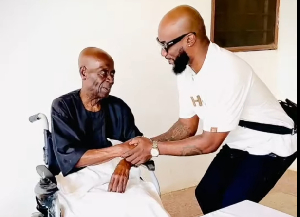A civil society group, Centre for National Affairs (CNA), has conducted a comprehensive research which concludes that the free Senior High School (SHS) education being proposed by the New Patriotic Party (NPP) flagbearer, Nana Addo-Dankwa Akufo-Addo, is absolutely possible to implement.
The NPP said if it was voted back into power, it would implement an educational policy that would ensure that education from basic to the SHS levels would be compulsory and completely free.
According to CNA, the capital requirement for the educational policy was likely to cost approximately $250million in the medium term.
CNA based its calculation on the total enrolment in JHS (all three years) and current primary-six (one year) students who were likely going to be the medium term beneficiaries of the policy.
“Based on our analysis, we conclude that while some critical details are lacking from the NPP, the programme is worth exploring and containable in public expenditure in the medium term,” stated the CNA in a press release issued yesterday.
According to data from the Ministry of Education, total national enrolment in public JHS was 1,387,588 for the 2010/2011 academic year while that of primary-six was 457,229.
In the statement signed by Eric Yeboah Nartey, head of policy research, CNA assumed that the total beneficiaries of the policy, including an estimated number of private school students who were likely to defect to public schools to benefit from the freebies in the medium term, would peak at 1,962,182.
In its calculations, the CNA used the latest Ghana Living Standard Survey’s (GLSS) to do the computation of cost requirement for the policy. In the GLSS, an amount paid per person attending SHS by households was equivalent to $148.
According to the CNA, any political party proposing a free educational policy would have to cover at least 84.6% ($118.4) of this household cost build-up.
This represents expenditure such as school fees- 42.9%, food, boarding and lodging- 27.6%, books supplies- 9.7%, uniform and sports- 3.5% and PTA dues- 2.5%.
CNA calculated that, “Assuming the policy takes effect in 2014 in a phased manner, starting with those entering SHS that particular year, this will amount to total cost of approximately $50 within the first year of implementation.
By which time those currently in JHS1 will be in SHS 1. However, if the NPP intends to make a grandstanding pronouncement for all students in SHS in 2014, then the additional outlay would be about $233 million.”
It is assumed that Ghana’s GDP for 2014 will be around $92.3billion. In CNA’s view, this boost in GDP would release an extra $645.9million that could be channelled into education. “We take the view that the buoyant outlook of our economy suggests these new expenditure items can be absorbed by the public purse within the medium to long term,” CNA noted.
“CNA is inspired by the fact that Government found GH¢1,145,865,991 for priority intervention programmes in 2012.
We believe that if indeed free SHS is a priority for the NPP, finding $231,537,476 to educate 1,962,182 Ghanaians in the medium term cannot be detrimental to the foundation of the economy. Going forward, we believe that tax lodgments from GETFund, expected revenue from the oil and gas sector, and efficient management of public funds are key,” said an optimistic CNA.
Indeed, CNA’s perspective conforms largely to similar analyses made by other think-tanks who went to work immediately the policy was proposed. IMANI, a highly vocal think-tank, had done some work on the concept and had concluded that it was feasible but a bit over ambitious.
These views are in sync with similar conclusion drawn by the education advocacy group, Ghana National Education Coalition.
“We have no doubts that any government, willing and determined to implement this policy, can do so successfully in collaboration with all stakeholders.”
However, since the NPP flagbearer hinted at this ambitious education policy, he has received intense bashing from the ruling NDC which has dismissed the policy as extremely unrealistic.
The NDC wondered how the NPP intended to mobilise the requisite resources to implement the policy.
The NPP insisted that the free educational policy was top on its priority list, given the declining state of education in Ghana.
The rate of educational transition was on a precipice, especially when hundreds of thousands of JHS students were unable to transit to SHS, mostly because of poor grades and lack of funding for their tuition in SHS.
General News of Friday, 17 August 2012
Source: Daily Guide
















